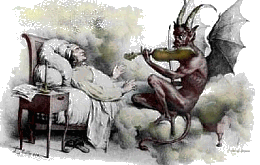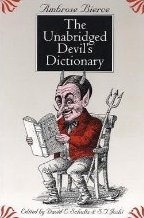ACCORD, n. Harmony.
|
AKKORD. Einklang.
|
ACCORDION, n. An instrument in harmony with the sentiments of an assassin.
|
AKKORDEON. Instrument im Einklang mit den Empfindungen eines Mörders.
|
APPLAUSE, n. The echo of a platitude.
ASS, n. A public singer with a good voice but no ear.
"Hail, holy Ass!" the quiring angels sing;
"Priest of Unreason, and of Discords King!"
Great co-Creator, let Thy glory shine:
God made all else, the Mule, the Mule is thine!"
G.J.
|
APPLAUS. Echo einer Platitüde.
BEIFALL. Einheit jener Währung, in der der Pöbel die bezahlt, die ihn streicheln und verschlingen.
ESEL. Öffentlich auftretender Sänger mit guter Stimme, doch ohne Gehör.
|
BLANK-VERSE, n. Unrhymed iambic pentameters—the most difficult kind of English verse to write acceptably; a kind, therefore, much affected by those who cannot acceptably write any kind.
|
BLANKVERS. Ungereimter jambischer Pentameter; die am schwierigsten annehmbar zu schreibende Form englischer Verse, daher die von jenen, welche keinerlei Vers annehmbar zu schreiben vermögen, bevorzugte Versform.
|
CLARIONET, n. An instrument of torture operated by a person with cotton in his ears. There are two instruments that are worse than a clarionet — two clarionets.
|
KLARINETTE. Folterinstrument, das von einer Person mit Watte in den Ohren bedient wird. Es gibt zwei Instrumente, die schlimmer sind als eine Klarinette: zwei Klarinetten.
|
CREMONA, n. A high-priced violin made in Connecticut.
|
CREMONA. Überaus teure Geige, hergestellt in Connecticut.
|
CRITIC, n. A person who boasts himself hard to please because nobody tries to please him.
There is a land of pure delight,
Beyond the Jordan's flood,
Where saints, apparelled all in white,
Fling back the critic's mud.
And as he legs it through the skies,
His pelt a sable hue,
He sorrows sore to recognize
The missiles that he threw.
Orrin Goof
|
KRITIKER. Einer, der sich rühmt, er sei schwer zufriedenzustellen, während doch niemand ihn zufriedenstellen will.

|
DANCE, v.i. To leap about to the sound of tittering music, preferably with arms about your neighbor's wife or daughter. There are many kinds of dances, but all those requiring the participation of the two sexes have two characteristics in common: they are conspicuously innocent, and warmly loved by the vicious.
|
TANZEN. Zum Klang quengelnder Musik herumhüpfen, vorzugsweise mit den Armen um Frau oder Tochter des Nachbarn. Es gibt viele Arten des Tanzens, doch haben all jene, die die Beteiligung beider Geschlechter erfordern, zwei Charakteristika gemein: Sie sind auffallend unschuldig und werden von den Lasterhaften innig geliebt.
|
DICTIONARY, n. A malevolent literary device for cramping the growth of a language and making it hard and inelastic. This dictionary, however, is a most useful work.
|
WÖRTERBUCH. Bösartige literarische Erfindung; dient dazu, das Wachstum einer Sprache zu hemmen und sie unelastisch zu machen. Das vorliegende Wörterbuch hingegen ist eines der nützlichsten Werke.
|
ELEGY, n. A composition in verse, in which, without employing any of the methods of humor, the writer aims to produce in the reader's mind the dampest kind of dejection. The most famous English example begins somewhat like this:
The cur foretells the knell of parting day;
The loafing herd winds slowly o'er the lea;
The wise man homeward plods; I only stay
To fiddle-faddle in a minor key.
|
ELEGIE. Verskomposition, in der der Verfasser, obwohl er keine der bekannten Verfahrensweisen des Humors anwendet, dennoch das Ziel verfolgt, im Geist des Lesers trübsinnigste Niedergeschlagenheit zu erzeugen.

|
ENTERTAINMENT, n. Any kind of amusement whose inroads stop short of death by injection.
|
UNTERHALTUNG. Jede Art Zerstreuung, deren Wirkung vor dem Totschlag durch Deprimieren endet.
|
FIDDLE, n. An instrument to tickle human ears by friction of a horse's tail on the entrails of a cat.
To Rome said Nero: "If to smoke you turn
I shall not cease to fiddle while you burn."
To Nero Rome replied: "Pray do your worst,
'Tis my excuse that you were fiddling first."
Orm Pludge
|
FIEDEL. Instrument, mit dem Menschenohren gepeinigt werden, indem man Roßhaar über Katzengedärm zerrt.

|
JEWS-HARP, n. An unmusical instrument, played by holding it fast with the teeth and trying to brush it away with the finger.
|
MAULTROMMEL. Unmusikalisches Instrument; wird gespielt, indem man es mit den Zähnen festhält und mit dem Finger wegzuschieben sucht.
|
LANGUAGE, n. The music with which we charm the serpents guarding another's treasure.
|
SPRACHE. Jene Musik, mit der wir die Schlangen beschwören, die fremde Schätze bewachen.
|
LYRE, n. An ancient instrument of torture. The word is now used in a figurative sense to denote the poetic faculty, as in the following fiery lines of our great poet, Ella Wheeler Wilcox:
I sit astride Parnassus with my lyre,
And pick with care the disobedient wire.
That stupid shepherd lolling on his crook
With deaf attention scarcely deigns to look.
I bide my time, and it shall come at length,
When, with a Titan's energy and strength,
I'll grab a fistful of the strings, and O,
The word shall suffer when I let them go!
Farquharson Harris
|
LEIER. Antikes Folterinstrument.

|
MINSTREL, adj. Formerly a poet, singer or musician; now a nigger with a color less than skin deep and a humor more than flesh and blood can bear.
|
BARDE. Einer, der Reime macht. Das Wort ist nur ein Alias unter vielen, die der Poet verwendet, um seine Identität zu verbergen und der Steinigung zu entgehen.
|
NOISE, n. A stench in the ear. Undomesticated music. The chief product and authenticating sign of civilization.
|
LÄRM. Akustischer Gestank. Ungezähmte Musik. Hauptprodukt und Kennzeichen der Zivilisation.
|
OPERA, n. A play representing life in another world, whose inhabitants have no speech but song, no motions but gestures and no postures but attitudes. All acting is simulation, and the word simulation is from simia, an ape; but in opera the actor takes for his model Simia audibilis (or Pithecanthropos stentor) — the ape that howls.
The actor apes a man — at least in shape;
The opera performer apes an ape.
|
OPER. Schauspiel, welches das Leben in einer anderen Welt darstellt, deren Bewohner statt der Sprache Gesang, statt Bewegung Gesten und statt Haltung Posen haben. Alle Schauspielerei ist Simulation, und dieses Wort kommt von simia, Affe; in der Oper jedoch nimmt sich der Schauspieler simia audibilis zum Vorbild (auch Pithecanthropus stentor genannt), den heulenden Affen.
CHOR. In der Oper eine Gruppe heulender Derwische, die das Publikum entsetzen, während die Sänger Atem schöpfen.
|
PHONOGRAPH, n. An irritating toy that restores life to dead noises.
|
PLATTENSPIELER. Irritierendes Spielzeug, das toten Lärm zum Leben erweckt.
|
PIANO, n. A parlor utensil for subduing the impenitent visitor. It is operated by pressing the keys of the machine and the spirits of the audience
|
KLAVIER. Gerät zur Unterwerfung aufdringlicher Besucher. Wird bedient, indem man die Tasten und das Gemüt der Zuhörer niederdrückt.
|
PLAGIARISM, n. A literary coincidence compounded of a discreditable priority and an honorable subsequence.
PLAGIARIZE, v. To take the thought or style of another writer whom one has never, never read.
|
PLAGIAT. Zufälliges literarisches Zusammentreffen; besteht aus schändlicher Priorität und ehrenvoller Nachfolge.
PLAGIIEREN. Denkweise oder Stil eines anderen Schriftstellers übernehmen, den man ganz bestimmt nie gelesen hat.
|
PUBLISH, n. In literary affairs, to become the fundamental element in a cone of critics.
|
|
REPLICA, n. A reproduction of a work of art, by the artist that made the original. It is so called to distinguish it from a "copy," which is made by another artist. When the two are made with equal skill the replica is the more valuable, for it is supposed to be more beautiful than it looks.
|
REPLIKAT. Reproduktion eines Kunstwerks, verfertigt von dem Künstler, der das Original schuf. So genannt, um es von der "Kopie" zu unterscheiden, die von einem anderen Künstler gemacht wird. Wenn beide gleich gut gemacht sind, ist das Replikat dennoch wertvoller, denn man nimmt an, daß es schöner sei, als es aussieht.
|
REQUIEM, n. A mass for the dead which the minor poets assure us the winds sing o'er the graves of their favorites. Sometimes, by way of providing a varied entertainment, they sing a dirge.
REVIEW, v.t.
To set your wisdom (holding not a doubt of it,
Although in truth there's neither bone nor skin to it)
At work upon a book, and so read out of it
The qualities that you have first read into it.
|

|
RIME, n. Agreeing sounds in the terminals of verse, mostly bad. The verses themselves, as distinguished from prose, mostly dull. Usually (and wickedly) spelled "rhyme."
RIMER, n. A poet regarded with indifference or disesteem.
The rimer quenches his unheeded fires,
The sound surceases and the sense expires.
Then the domestic dog, to east and west,
Expounds the passions burning in his breast.
The rising moon o'er that enchanted land
Pauses to hear and yearns to understand.
Mowbray Myles
|
REIM. Gleichartiger Klang am Ende von Versen, meistens schlecht. Die Verse selbst sind, im Unterschied zu Prosa, meistens öde.
IMPROVISATOR. Einer, der beim Verseschmieden fröhlicher ist als sein Publikum beim Zuhören.
AMATEUR. Öffentliches Ärgernis; hält Neigung für Fähigkeit und verwechselt sein Wollen mit seinem Können.
KONZERT. Veranstaltung zur Demütigung von Babys durch überlegenes Geheule.
|
SIREN, n. One of several musical prodigies famous for a vain attempt to dissuade Odysseus from a life on the ocean wave. Figuratively, any lady of splendid promise, dissembled purpose and disappointing performance.
|
SIRENE. Eins von mehreren musikalischen Wundern; berühmt wegen eines vergeblichen Versuchs, Odysseus von einem Leben auf hoher See abzubringen. Übertragen: jede Dame mit blendenden Versprechungen, verborgenen Absichten und enttäuschenden Leistungen.
|
END, n. The position farthest removed on either hand from the Interlocutor.
The man was perishing apace
Who played the tambourine;
The seal of death was on his face—
'Twas pallid, for 'twas clean.
"This is the end," the sick man said
In faint and failing tones.
A moment later he was dead,
And Tambourine was Bones.
Tinley Roquot
|

|








